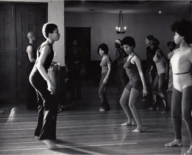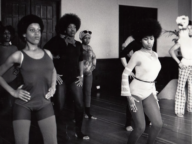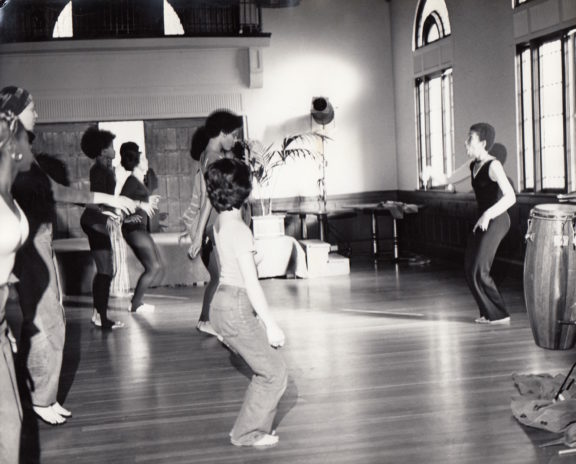In addition to classes in Swahili, photography, batik making and grant writing, Rainbow Sign held dance classes. The teacher in these photographs appears to be a young Halifu Osumare, then just Halifu, a professional dancer, choreographer and educator who frequented Rainbow Sign and often lectured, performed and, as we can see, held classes.
In 1973, Halifu had recently returned to the Bay Area after spending several years in North Africa and Europe, where she choreographed for Swedish television, as well as for her own company in Copenhagen. While on the faculty at San Francisco State, her work “Four Women” premiered at Rainbow Sign in October of 1973. As described in the Oakland Post, the show, “integrates the many roles of Black women, covering the Gay Thirties of the Billie Holiday era slavery, the traditional church. Africa and today’s Black woman, as well as articulating the interdependency of these roles…She has assembled for this production four women who display an array of talents — Ota, a singer; Stephanie Jack, an actress; Nashira, a musician; and Ntozake Shange, a poetess.”
Of the four, Ntozake Shange went on to become a very well-known literary figure and prominent Black feminist, first garnering acclaim with her 1975 Obie-award winning play, for colored girls who have considered suicide / when the rainbow is enuf. While the “rainbow” here is not a direct reference to the Rainbow Sign, Shange has been quoted talking about the difference of feeling in the California Black Arts movement:
“There’s not a California style, but there are certain feelings and a certain freeness that set those writers off from those in the Chicago-St. Louis-Detroit tripod group…so that the chauvinism that you might find that’s exclusionary, in that triangle, you don’t find too much in California.”
The Rainbow Sign was a bastion of female empowerment within an often overly masculinist Black Arts movement, and was doubtlessly in Shange’s consideration as she made this observation.
Ntozake Shange wrote novels and books of poetry, in addition to over a dozen plays, before her passing on October 27, 2018. Dr. Halifu Osumare has served as director of African American and African studies at the University of California Davis, and is the author of Dancing in Blackness: A Memoir (2018).


